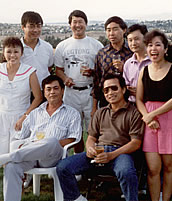Continued from page 3
The Elderly
Southeast Asian American elders are an increasing group that has special needs that are only beginning to be addressed. They may be linguistically and social isolated, without the social network they would have in their homeland village or community. This isolation is compounded if they do not live near friends or have access to ethnic communities or senior centers, particularly if they do not drive or live near public transportation. Their wisdom and skills are displaced in the U.S. context and, as a result, they may feel depressed and useless.
Accustomed to family living arrangements in the homeland, where multiple generations lived in one household and older generations help care for young children, many elders have had to adjust to restructured living arrangements. Traditionally, adult daughters cared for the parents, or the parents lived with the oldest son and his family in their senior years. Some families maintain this practice, but is not always feasible in the U.S. context. Mainstream senior care facilities or nursing homes often do not accommodate linguistic or cultural needs, such as ethnic foods. Ethnic communities, together with local social service agencies, have tried to set up senior citizen centers that can provide leisure activities and assist with access to medical services. Unfortunately, such services are too often very limited.

|
|


